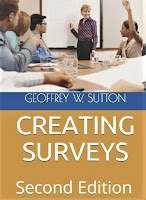A Confounding variable is a variable that produces unexpected changes in the dependent variable and
therefore interferes with interpreting the capacity of an independent variable to produce or explain changes in a dependent variable.
Example: During a study of anxiety that includes measures of anxiety and stress, some participants watch a documentary about the treatment of anxiety and some do not. Documentary-watching may confound the results if watching the program influenced the scores on the measures of anxiety and stress. Similarly, some participants may be exposed to a source of stress in their environment but others are not, which could interfere with interpreting the results.
Learn More about research methods and variables in Creating Surveys on AMAZON or GOOGLE
Please check out my website www.suttong.com
and see my books on AMAZON or GOOGLE
STORE
Also,
consider connecting with me on FACEBOOK Geoff W. Sutton
TWITTER @Geoff.W.Sutton
You can read many published articles at no charge:
Academia Geoff W Sutton ResearchGate
Geoffrey
W Sutton

Comments
Post a Comment